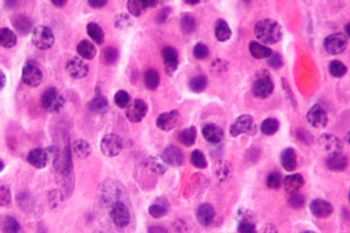
The FDA approved axatilimab for adults and children with chronic graft-vs-host disease whose disease progressed after 2 or more lines of systemic therapy.

The FDA approved axatilimab for adults and children with chronic graft-vs-host disease whose disease progressed after 2 or more lines of systemic therapy.

An expert discusses recent advancements in breast cancer treatment, focusing on the addition of CDK4/6 inhibitors for high-risk ER-positive, HER2-negative breast cancer.

Denileukin diftitox received FDA approval to treat relapsed/refractory cutaneous T-cell lymphoma previously treated with at least 1 systemic therapy.

This marks the first approval of a systemic therapy for patients with grade 2 astrocytoma or oligodendroglioma with an IDH1 or IDH2 mutation.

Donna Catamero, ANP-BC, OCN, CCRC, discusses the importance of quickly identifying and managing adverse effects from CAR T-cell therapy in patients with multiple myeloma.

Developing a strong working relationships and understanding the physical and emotional demands of the oncology specialty are some ways nurses can address burnout, an expert said.

With several options available for the second-line treatment of HR-positive, HER2-negative mBC, an expert emphasized the importance of tailoring treatment for every patient.

Daniel Verina, DNP, ACNP-BC, discussed how CAR T-cell therapy is changing the treatment landscape for patients with multiple myeloma.

Throughout June, the FDA approved drugs for the treatment of diseases including myelodysplastic syndrome, thyroid cancer, endometrial cancer, colorectal cancer, and follicular lymphoma.

The ready-to-dilute formulation of Tepylute for breast and ovarian cancers can help to reduce prep time and provide more accurate dosing.

Accelerated approval has been granted to adagrasib for use with cetuximab in previously treated adults with KRAS G12C-mutated locally advanced or metastatic colorectal cancer.

The approval of this pembro-chemo combination for adults with primary advanced or recurrent endometrial carcinoma includes those with mismatch repair-proficient or -deficient disease.

The FDA granted accelerated approval to repotrectinib to treat adult and pediatric patients with NTRK gene fusion-positive solid tumors.

This traditional approval updates the accelerated approval that selpercatinib received in 2020 for this indication in patients 12 years and older.

Oncology nurses can aid in the identification and management of oral adverse effects from cancer therapies.

Findings from this safety run-in cohort of teclistamab, daratumumab, and lenalidomide in newly diagnosed multiple myeloma will steer how randomization of the MajesTEC-7 trial will commence.

Patients with refractory EGFR-mutated, advanced non-small lung cancer had improved responses with low rates of adverse effects with subcutaneous amivantamab vs its intravenous formulation.

This marks the only CAR T-cell therapy approved by the FDA for 4 subtypes of non-Hodgkin lymphoma.

Selpercatinib was granted accelerated approval from the FDA for patients aged 2 years and older with thyroid cancer or solid tumors with RET mutations.

Using an artificial intelligence-based navigation tool to contact patients who missed their colonoscopy appointment may help them reschedule and potentially attend a new appointment.

Converting operating rooms into those that are able to filter surgical smoke and biological contaminants can make workplaces safer for nurses and other health care staff.

Tarlatamab, a bispecific T-cell engager, was approved by the FDA for adults with extensive-stage small cell lung cancer.

Lisocabtagene maraleucel was approved by the FDA to treat adults with relapsed/refractory follicular lymphoma who were treated with 2 or more prior lines of systemic therapy.

Tiffany Bostwick, P.A., discussed the importance of communication and education around adverse effects for both oncology nurses and for patients with advanced endometrial cancer who are treated with immunotherapies.

The implementation of a nurse navigator in a lymphedema program has helped patients with the condition obtain timely care, which can potentially improve outcomes.

In this episode of The Vitals, we speak with an expert who discussed the importance of supportive care and education for patients with lung cancer who are treated with immunotherapy.

The role of a verification nurse can lead to several benefits, including the prevention of errors from reaching the patient, decreased workload, and potential cost savings from less drug waste.

Throughout April, the FDA approved drugs for the treatment of diseases including solid tumors, lung cancer, multiple myeloma, bladder cancer, and low-grade glioma.

A feasibility study on the use of a mobile application for patients after undergoing a stem cell transplant may help care teams quickly identify and treat graft-versus-host disease.

Tools to educate oncology nurses and patients on the use of Mepitel film to prevent radiation dermatitis has improved the workflow around its introduction to patients with breast cancer, as well as its application and maintenance.